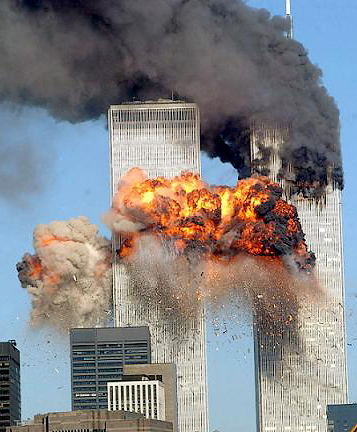 I really hope it’s not ‘too soon’, but you never know. ‘Too soon’, of course, is the response topical jokes about catastrophes sometimes receive when the public mood is not quite ready for light to be made of whatever disaster, tragedy or scandal is being targeted by a comedian. It was also the response to several statements, articles and speeches written by very serious people in 2001, following the terrorist attacks on the Twin Towers on 11 September. Several columnists, activists and philosophers were vehemently criticized within the first few months following the September 11th attacks, for daring to ask certain questions or make certain observations about the events. And even now, as I consider bringing them up nine years later, I suspect some people will be muttering: ‘too soon’ and wishing I’d be quiet.
I really hope it’s not ‘too soon’, but you never know. ‘Too soon’, of course, is the response topical jokes about catastrophes sometimes receive when the public mood is not quite ready for light to be made of whatever disaster, tragedy or scandal is being targeted by a comedian. It was also the response to several statements, articles and speeches written by very serious people in 2001, following the terrorist attacks on the Twin Towers on 11 September. Several columnists, activists and philosophers were vehemently criticized within the first few months following the September 11th attacks, for daring to ask certain questions or make certain observations about the events. And even now, as I consider bringing them up nine years later, I suspect some people will be muttering: ‘too soon’ and wishing I’d be quiet.
But that is simply because ‘soonness’ has nothing to do with why people objected then (as they do now) to certain things being said about 9-11. It’s the same impulse that makes ordinarily rational people object to a mosque being built near the site of the Twin Towers (in which a Muslim prayer room operated peacefully for many years). Because of the great number of people killed in that area, on that day, both have taken on a kind of sacred character for many. This is understandable for the friends and relatives in particular of those who died, but it should not preclude us from asking a question that several people were lambasted for asking nearer to the time: was there anything fundamentally more important about the people killed on September 11 than all other people?
Philosophers and critics who pointed out that while the events of September 11 were tragic and horrible they were not that out of keeping with what was experienced by the rest of the world were attacked for being outrageous, disloyal and speaking ‘too soon’. Is it still too soon now to ask why we still care so much about the 3,000 victims of that attack while even then we could hardly muster as much sympathy for the 20,000 who died in India that January? Is it too soon to ask why every civilian casualty in America should be venerated and mourned, while in our wars in the Middle East they should not even be counted?
Is it still too soon to genuinely ask the question: ‘Why do they hate us?’ without resorting to cartoon answers that assume madness, fanaticism or unadulterated evil and take no factors into account like the historic and economic oppression of Muslim countries by western powers or of the millions of children that had died in Iraq due to American sanctions and been deemed ‘acceptable’ by the US Secretary of State?
Is it still too soon to point out that American lives (and British lives, for that matter) are not nor have they ever been, more valuable than those of civilians or combatants in states with whom we are at war or in regions where our friends or companies commit misdeeds? Is it still too soon to ask Christians in particular to recognise this fact?
Is it too soon to compare the motives of the hijackers to the motives of those who pushed for the Iraq invasion for moral worth?
Is it still too soon to start comparing the numbers of dead in Afghanistan and Iraq, through military conflict and subsequent chaos, on both sides, to the numbers killed on September 11?
I’m not saying that all or even any of these questions would in any way justify the taking of human life (on September 11 2001 or any other day). I am also not saying that the dead from the Twin Towers should not be mourned, and that with respect and dignity. But the ‘war on terror’ continues. Iraq and Afghanistan will live for generations with the consequences of the actions undertaken by governments we elected in response to 9-11. If we don’t ask questions now, or some time soon, we never will. And we will make the same awful mistakes again.
Filed under: Al Qaeda, Christianity, Islam, Justice, news, politics, September 11th, United Kingdom, Wars | Tagged: september 11 | Leave a comment »

